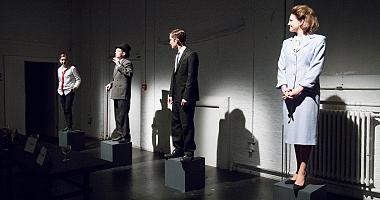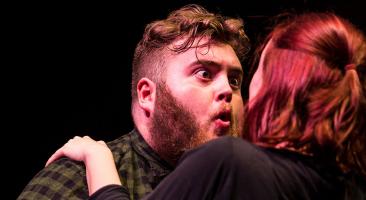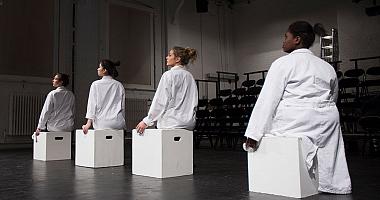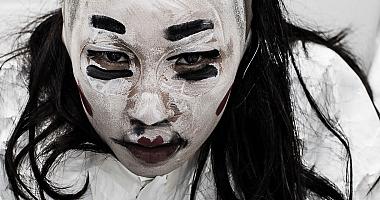MA
Applied Theatre: Drama in Educational, Community & Social Contexts
Content navigation menu
Why study MA Applied Theatre: Drama in Educational, Community & Social Contexts at Goldsmiths
Develop your ability to contextualise, critique, and create. This MA addresses the historical, political, theoretical and ethical issues of applied theatre, and explores the ways it is created by diverse groups of people.
- The Masters is aimed at early-career practitioners with a background in theatre, education, activism or social change, as well as at more established practitioners who want to reflect, refresh and develop their skills.
- Develop your skills as a collaborative, responsive, imaginative, politically engaged and culturally aware artist practitioner.
- Explore how theatre is created in schools, on the streets, in children’s homes, care homes, conflict zones, creches, youth clubs, prisons, women’s refuges, and refugee centres – anywhere groups of people meet and interact.
- The degree is structured so that practice and theory constantly respond to one another through practical classes and seminars. You will undertake a placement in a recognised host organisation, where you'll work with experienced practitioners and learn how participatory arts organisations function, from an insider’s perspective.
- Learn about the dynamic and ever-changing field of applied theatre: an umbrella term for a range of performance forms concerned with personal and social change. The term embraces everything from the theatre of the oppressed and prison theatre, to theatre-in-education and theatre for development.
- You will have the opportunity to explore case studies from the UK and around the globe, using them to inform discussions on questions of identity, representation, health, equality, human rights, aesthetics, and the role of the artist, among many others.
- You will work with and learn from tutors who are practising artists in a variety of performance, community and social settings.
Contact the department
If you have specific questions about the degree, contact Gail Babb.
Length
1 year full-time or 2 years part-time
Entry requirements
You should have (or expect to be awarded) an undergraduate degree of at least 2:1 standard in a relevant subject. You might also be considered if you have relevant experience and can show you have the ability to work at postgraduate level. All candidates must fulfil our Fitness to Train requirements
Fees
Home - full-time: £10350
Home - part-time: £5175
International - full-time: £19520
Department
What you'll study
Compulsory modules
| Module title | Credits |
|---|---|
| Applied Drama: History, Theory, and Contexts | 30 credits |
| Analysis of Practice | 30 credits |
| Dissertation | 60 credits |
Optional modules
In addition to these core modules, you'll also complete a series of contextual courses to the value of 60 credits. These are lecture- or practice-based modules from one of our other exciting MA programmes.
Previous modules have included: Disability Theatre, African Theatre, Performance Praxis, Radical Performance, Cultural Theory, and The Reflexive Practitioner (open only to Applied Theatre students). These are taken in Year 2 by part-time students.
Note about optional modules (if available): The above is indicative of the typical modules offered, but is not intended to be construed or relied on as a definitive list of what might be available in any given year. The module content and availability is subject to change.
Teaching style
A range of learning and teaching methods to support the learning outcomes: seminars, mini-lectures, presentations by visiting practitioners, tutorials, practical workshops led by staff and visiting tutors, laboratory workshops led by students, placement project; and the dissertation.
The programme is augmented by selected visits to theatre companies, productions, workshops and public seminars and debates.
Assessment
The MA Applied Theatre has five points of assessment:
- a 6,000-word essay based on material covered in the Autumn Term
- a 6,000-word reflective portfolio on the placement
- a 12,000-word research project/dissertation
These assessments count towards 80% of the final mark.
The remaining 20% is derived from assessment of the two shared complementary/contextual modules, which include Disability Theatre, Performance Praxis, African Theatre, Musical Theatre and Cultural Theory.
Programme structure
Autumn Term
We look at the roots of Applied Theatre in Education, in Social and Political Change, and in Community. Classes include work with Geese Theatre on their use of masks in Prisons, Drama and Theatre in Education techniques with Gail Babb, intergenerational arts practices with Course Director Sue Mayo, and the use of Drama with Refugees and Asylum Seekers. Throughout this term, students are also engaged in skills-sharing sessions in order to pool their knowledge and expertise.
Practice-based classes are linked to a contextual strand, taught through seminars, that enables us to consider the thinking behind our embodied knowledge. Through a series of seminars, we consider the development of applied methodologies from its roots in political theatre; radical and celebratory arts; drama and theatre-in-education; community theatre; prison theatre; therapeutic creative practices and the legacy of Freire and Boal. We study the growing body of writing on applied theatre and its practitioners, and theatre theory.
Spring Term
The module Analysis of Practice focuses on the practices of Applied Theatre. We have a short festival of art forms, with classes in song, puppetry and dance, and a residency shared with students of the MA Performance Making, working across modules with artists of distinction from within the Goldsmiths' staff and beyond.
Throughout the practical sessions, we work with you to develop your facilitation, devising, project planning and management skills with attention to issues such as group dynamics; power and leadership; inclusion; accessibility; equality; conflict; intercultural practice; safe space and the ethics of touch.
Tutor Raj Bhari from the Peaceful Change Initiative teaches about creative approaches to community cohesion, conflict resolution, and the artist as activist.
At the end of the term, students design and lead a weekend of workshops for a public audience.
Placement
We support you to locate and develop a placement in a recognised host organisation. On the placement you further the skills you have practised on the programme, while dealing with the challenges of a professional context.
Placement hosts include London Bubble, Magic Me, Resonate. Greenwich & Lewisham Young People's Theatre, Talawa Theatre, Pan-arts, Crisis, Ovalhouse, Green Shoes Arts, The Young Vic, MIND, CEN8, Lewisham Youth Theatre and Spare Tyre.
Teaching days
Full-time students are in Goldsmiths Monday to Wednesday in the Autumn and Spring Terms.
Part-time students are in Goldsmiths on Tuesdays and Wednesdays in the Autumn and Spring Terms of Year 1, and Mondays only in Year 2.
In the Summer Term, for both years, there are five days of teaching in April and May (dates to be confirmed).
Facilities
As a Goldsmiths drama student you will have access to our fully equipped George Wood Theatre, five studios and our design spaces, which include a sound and media studio and well-equipped workshops for set construction and costume making.
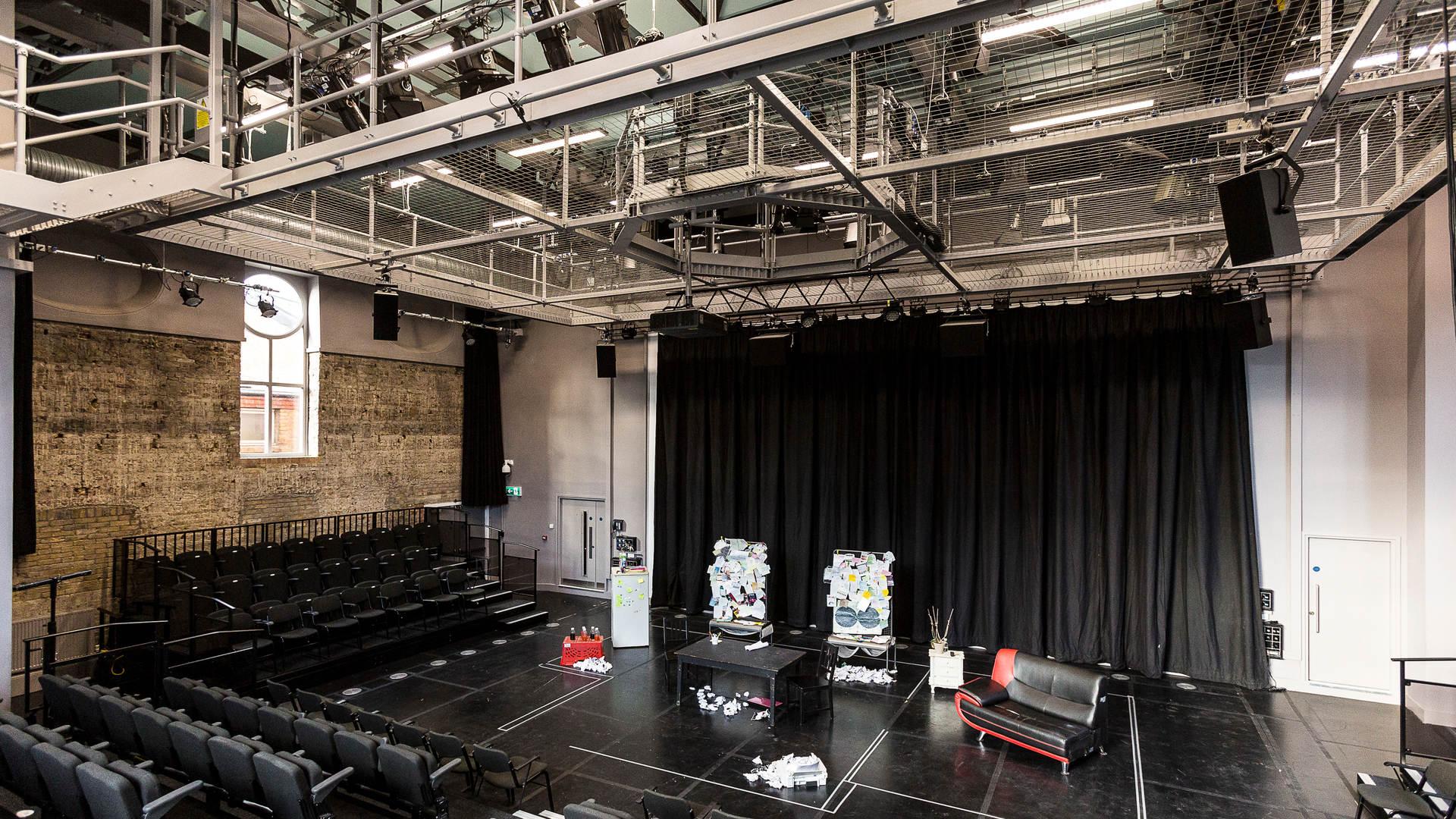
George Wood Theatre
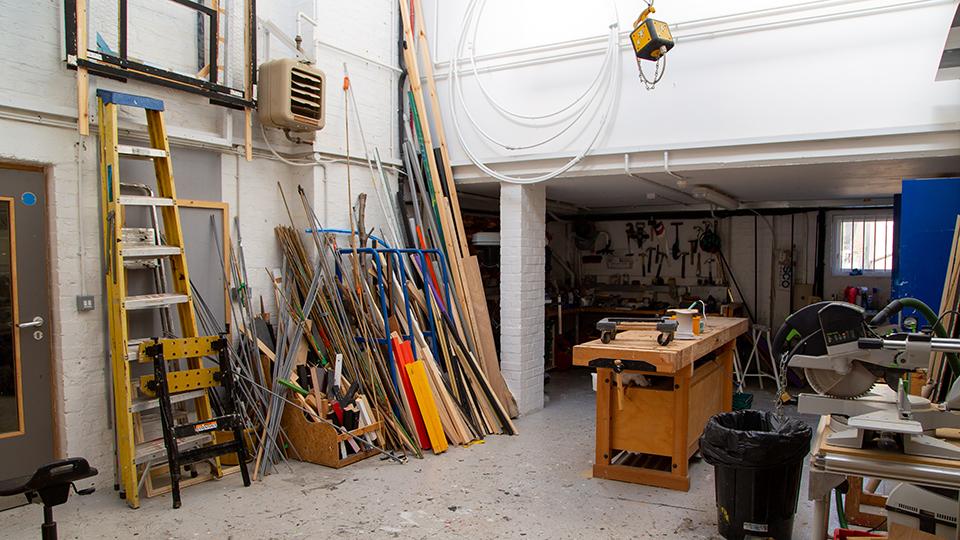
Set and prop workshop
Entry requirements
You should have (or expect to be awarded) an undergraduate degree of at least second class standard in a relevant/related subject.
You might also be considered for some programmes if you aren’t a graduate or your degree is in an unrelated field, but have relevant experience and can show that you have the ability to work at postgraduate level.
Priority is given to applicants with experience in the applied theatre field. This could be volunteering or assisting in work that is about working collaboratively through drama, using drama as a learning medium, or using drama for social change, among others.
Please note: You must also fulfil our Fitness to Train requirements.
International qualifications
We accept a wide range of international qualifications. Find out more about the qualifications we accept from around the world.
If English isn’t your first language, you will need an IELTS score (or equivalent English language qualification) of 6.5 with a 6.5 in writing and no element lower than 6.0 to study this programme. If you need assistance with your English language, we offer a range of courses that can help prepare you for postgraduate-level study.
How to apply
Apply directly to Goldsmiths using our online application system
You apply directly to Goldsmiths using our online application system.
Before submitting your application you’ll need to have:
- Details of your academic qualifications
- The email address of your referee who we can request a reference from, or alternatively a copy of your academic reference
- Copies of your educational transcripts or certificates
- A personal statement – this can either be uploaded as a Word Document or PDF, or completed online. Please see our guidance on writing a postgraduate statement
You'll be able to save your progress at any point and return to your application by logging in using your username/email and password.
When to apply
We accept applications from October for students wanting to start the following September.
We encourage you to complete your application as early as possible, even if you haven't finished your current programme of study. It's very common to be offered a place that is conditional on you achieving a particular qualification.
Late applications will only be considered if there are spaces available.
If you're applying for funding, you may be subject to an earlier application deadline.
Selection process
Admission to the programme is by interview (in person, or via Skype), where we will discuss your work experience. Please note we prioritise applicants with a minimum of one year of relevant work experience. We will also discuss some reading, which you will be sent in advance if doing a Skype interview.
Find out more about applying
Fees and funding
Annual tuition fees
These are the PG fees for students starting their programme in the 2024/2025 academic year.
- Home - full-time: £10350
- Home - part-time: £5175
- International - full-time: £19520
If your fees are not listed here, please check our postgraduate fees guidance or contact the Fees Office, who can also advise you about how to pay your fees.
It’s not currently possible for international students to study part-time under a student visa. If you think you might be eligible to study part-time while being on another visa type, please contact our Admissions Team for more information.
If you are looking to pay your fees please see our guide to making a payment.
Funding opportunities
Find out more about postgraduate fees and explore funding opportunities. If you're applying for funding, you may be subject to an application deadline.
Goldsmiths also offers a range of international scholarships including Humanitarian Scholarships for prospective Masters students from Palestine.
Additional costs
In addition to your tuition fees, you'll be responsible for any additional costs associated with your course, such as buying stationery and paying for photocopying. You can find out more about what you need to budget for on our study costs page.
There may also be specific additional costs associated with your programme. This can include things like paying for field trips or specialist materials for your assignments. Please check the programme specification for more information.
Careers
Where this degree can take you
Our students go on to work in a range of roles including setting up and running community/participatory theatre companies, as freelance drama workshop facilitators, lecturers, heads of education or participation producers within established theatre companies.
Previous students have gone on to carry out:
- Setting up independant companies
- Working as freelance director and facilitators
- Arts projects with refugees and migrants
- Arts work with people with learning disabilities
- Theatre work with early years
- Creative work in schools and pupil referral units
- Cross-arts projects in a range of educational, community and social contexts
- Theatre education and outreach
- Community theatre
- Museum education
- Theatre in prisons and with youth risk
Previous graduates from the programme have also continued with research study towards the MPhil or PhD qualification.
We have graduates working at the Southbank Centre, the Royal National Theatre, The Young Vic, Brighton Dome, Pan Arts, Rewrite, Ovalhouse, Battersea Arts Centre, the Albany and Talawa Theatre; with MIND, Tender, Magic Me, and Headway.
Companies set up by past students include:
Graduates are also working in India, the Caribbean, Brazil, Columbia, Estonia, Greece, Germany, Italy, Russia and the Philippines.
Skills
The MA aims to equip you with the appropriate background knowledge and understanding to work creatively and critically within the broad remit of applied theatre. Recent research identified three core skills for participatory artists working in socially engaged theatre practice.
These are:
- Critical thinking: the ability to contextualise and interrogate practice in the light of current thinking and practice
- Creativity: the ability to take creative risks based on a strong skill base
- Responsiveness: the ability to reflect and adapt
The programme works with these core skills threaded through its methodology, while also offering opportunities to look at the hard skills of planning, documenting and evaluating work.
Find out more about employability at Goldsmiths


